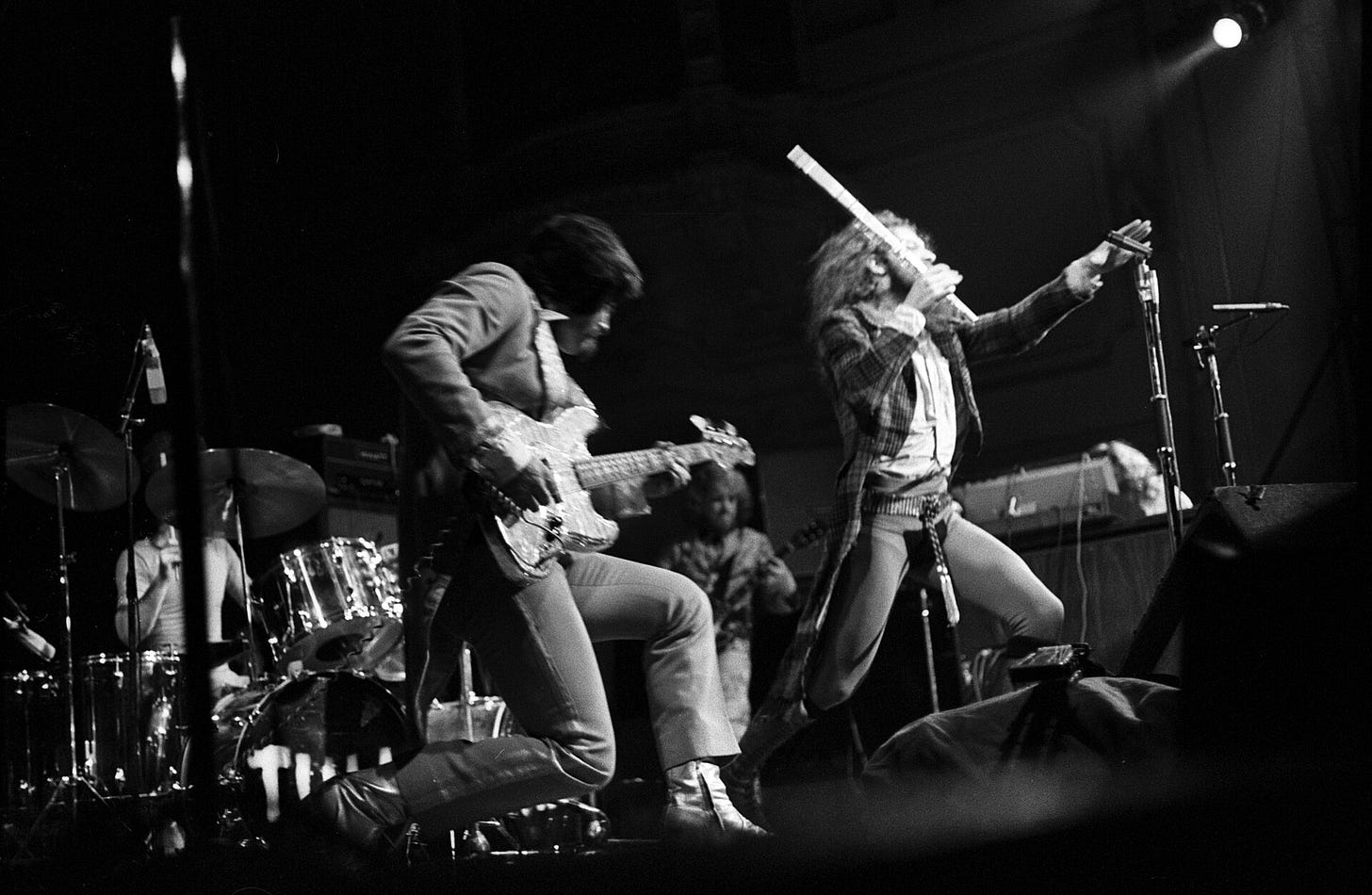Strange Worlds: Narrative & Literature in Progressive Rock
A little known side to a very forgotten sub-genre.
There exists perhaps no sub-genre of music as unpopular and as little understood as progressive rock, or "prog" as the fans call it. Apart from its brief popularity in the 1970s —by '78, it was nearly a dead genre— prog has been ignored and even demonized by critics to the extent that the passing of Keith Emerson (one of the most virtuosic keyboardists in the history of rock and a key figure in the movement) was practically ignored by the mainstream media.
But what exactly is prog? Difficult to define, even among the fandom, the origins of progressive rock are debatable, but the general consensus is that the bands that originated this movement sought to elevate rock to a level of artistic credibility, moving away from the verse-chorus-verse format and the 4/4 time signature (the compass used in most commercial songs), incorporating sounds and composition techniques found in jazz and classical music.
The incredible proliferation of bands, especially in Europe, led to many subgenres (more than fifteen to date), ranging from symphonic rock (complex compositions divided into movements akin to symphonies) to Progressive Electronic which emerged in Germany and were the first bands to incorporate the beat as it's known today (perhaps the most influential bands being Kraftwerk and Tangerine Dream—the latter even gave a private concert for Salvador Dalí when the band was called The One in 1967–).
Despite its variety and immense musical richness, paradoxically, prog is buried deep within the underground music scene, and I say paradoxically because its importance in the history of music cannot be understated nor calculated, as it has influenced many of the groups that revolutionized music, including The Sex Pistols, Nirvana, and Radiohead.
And thus the inevitable question manifests itself: what is the least talked about aspect when discussing such an obscure and forgotten sub-genre? The answer is simple: the lyrics and the themes in the records. These two aspects are often overlooked even by the fans but are essential to understand and, above all, define Progressive Rock.
Philosophy, spirituality, mysticism, science fiction, surrealism, and even humor, were among the themes sung about by groups like Yes, Genesis, Rush, and Emerson, Lake & Palmer. Ultimately, the highly virtuosic musicianship (it's important to note that most prog musicians are very skilled players) was not enough to convey the message; there had to be lyrics, and like the music, they had to extend beyond popular culture.
A great example of science fiction in prog can be found in the band Emerson, Lake & Palmer. In their most ambitious work, the LP "Brain Salad Surgery" (1974)—whose cover was drawn by H.R. Giger, the same artist who designed the creatures in Ridley Scott's film "Alien"—they speak of the birth of computers at the hands of man and their eventual dominion over him. In the main and extensive song of the album, titled "Karn Evil 9," towards the end of the final movement, a computerized voice sings, "Stranger! Load your program. I am yourself.”; Man ends up ruled by his own invention, which now dictates his identity (social media? anyone?). The song "Jerusalem" on the same album is a musicalized version of the poem “And Did Those Feet in Ancient Time” by the English poet and mystic William Blake and sung like a hymn by Greg Lake.
When Peter Gabriel was the lead vocalist and primary lyricist in Genesis, his surreal lyrics shaped the band's initial identity, touching on diverse themes like Narcissus, two lovers reuniting amidst the Apocalypse, hermaphrodites, and a Puerto Rican punk in New York named Rael. Genesis even incorporated characters from other classical works into their songs, as in the case of "The Cinema Show," depicting an afternoon when Romeo and Juliet go to the movies and encounter Tiresias, the blind prophet from T.S. Eliot's monumental poem "The Waste Land." The album that contains that song is curiously titled Selling England by the Pound (1973) for it was Ezra Pound who edited the mentioned poem, which paved the way for Eliot to win the Nobel Prize in 1948.
Spirituality is present in many of Yes's lyrics, especially those penned by their former vocalist and one of the band's founders, Jon Anderson, whose interest in the spiritual permeates across the band’s discography. While touring, Anderson read "Autobiography of a Yogi" by Paramahansa Yogananda and learned of the existence of four sacred Hindu scriptures called the Shastras. These holy texts drove him to convince the band to create a conceptual album (concept albums, although not exclusive to progressive rock, were one of its most representative characteristics) based on them. The result was a double LP titled "Tales from Topographic Oceans" (1973), consisting of four songs over 18 minutes long spread over two sides, each representing musically one of the Shastras. Jon Anderson has continued to explore these themes in his solo albums, including the record "Toltec" (1996) which delves into the mysticism behind Native American tribes.
While the Canadian trio Rush is known more for their virtuosity and breaking into mainstream success than their lyrics (handled by their drummer Neil Peart who is considered one of the greatest and most influential drummers of all time), their quality and diversity are undeniable, covering themes like Ayn Rand's Objectivism in the case of the song "2112," or songs like "Limelight," which openly discusses fame: "I have no heart to lie, I can't pretend the stranger is a long-awaited friend." Neil’s loss of his wife and daughter just months apart drove him to get on his motorcycle and travel through parts of the United States, Alaska, Canada, Mexico, and Belize, a journey he recorded in the book “Ghost Rider: Travels on the Healing Road."
Humor can be found in prog thanks to the prodigious Frank Zappa who vocalized his elaborate compositions with lyrics full of satire, humor, critique, and obscenities. The question he posed, "Does humor belong in music?"—which is also the title of a 1986 live album—was repeatedly answered by his work, where he sang about Mexicans, groupies, oral sex, and spankings, among other topics many of them controversial. Zappa was so committed to free speech that he appeared before the United States Senate in 1985 to defend freedom of speech in music.
Perhaps the least known of the groups in the prog pantheon, Camel recorded an instrumental album based on the novel "The Snow Goose" by Paul Gallico. The album is commonly referred to as The Snow Goose" among the band's followers, but its real title is "Music Inspired by The Snow Goose" due to legalities; Gallico refused to allow them to use excerpts from the novel as lyrics, which forced Camel (in my opinion a blessing in disguise) to record an instrumental album that beautifully captures the scenes and landscapes of the novel.
Arguably, the best example of how lyrics define a band's identity is the case of the French group Magma. Magma's vocalists consist of a small choir that sings in the language Kobaïan, invented by their drummer, leader, and founder, Christian Vander, to narrate the conceptual story —told across most of their discography— about the founding of the planet Kobaïa by refugees who escaped Earth. Kobaïan is a phonetic language based on Slavic and Germanic languages—some say also influenced by the scat-yodeling of jazz singer Leon Thomas— and the central piece in the band's complex ensemble that breathes life into the Kobaïa space opera.
Jethro Tull's music (another prog giant that managed to break into the mainstream) contains cryptic lyrics written by its charismatic frontman, Ian Anderson. Among his works, two albums stand out in terms of narrative —coincidentally the most representative of their sound and also acclaimed by fans and critics—. The first is "Aqualung" (1971), whose lyrics are a harsh critique of The Church of England and religious hypocrisy, exemplified in passages like "If Jesus saves – well, He'd better save himself from the glory seekers who use His name in death." The other example is their concept album considered by many their masterpiece, "Thick as a Brick" (1972), whose lyrics are a long poem published in a local English newspaper and written by a child prodigy named Gerald Bostock. However, Gerald Bostock never existed; it was all a fabrication by the band. The original LP came with a printed reproduction of the fictional newspaper, reinforcing the album's conceptual theme.
In the 1980s, Marillion —named after J.R.R. Tolkien's "Silmarillion"— sang in their first four albums (with lyrics by their former vocalist Fish), about modern man's struggles against demons like substance abuse, heartbreak and divorce, unemployment, and political oppression, in a raw and poignant manner, putting the ordinary man right up there with the classic hero.
Tool, the iconic American progressive metal band, is meticulous about their lyrics and how they engage with their music; they even composed a song, Lateralus, to the Fibonacci sequence. Throughout their work, they’ve sung about such diverse topics as evolution, child abuse, extraterrestrials, and Jungian psychology. The covers of their last three albums, designed by artist Alex Grey, contain several esoteric elements, including sacred geometry —particularly Enochian symbols— and can be defined as modern spiritual art.
The list goes on: The Alan Parsons Project based their entire first album on the stories of Edgar Allan Poe; Emily Brontë's "Wuthering Heights" inspired Genesis's last purely progressive album when Phil Collins was already the vocalist. The Godfathers of progressive rock, King Crimson, sang about various subjects, including discipline, the existence of God, and the neurotic man throughout their different musical phases. Porcupine Tree's magnum opus, "Fear of a Blank Planet" (2009), is heavily influenced by the themes found in Bret Easton Ellis's novel "Lunar Park." An example from the national scene is the talented Mexican band Ekos, who speak metaphorically and allegorically about the human condition in their debut LP "Luz Interna" (2013). Many Italian bands created music based on classical works like Dante's "Inferno" in the case of the group Metamorfosi, "Zarathustra" by Museo Rosenbach, and "The Passion According to St. Matthew" was set to music by the refined trio Latte e Miele, to name a few.
One could write a book about the themes found in progressive rock albums. Maybe even two. But it is not the purpose of this text to create an encyclopedic compendium but to discuss perhaps the most ignored yet immensely rich side of prog, both in its references to great literature and in its narrative proposals, which for the most part possess great literary quality and, unlike novels, poems, and short stories, come fully musicalized.1
This is an updated version of an article published in a supplement magazine by Librerías Gandhi, Lee+, in the Year 8 Number 86 July 2016 edition.







